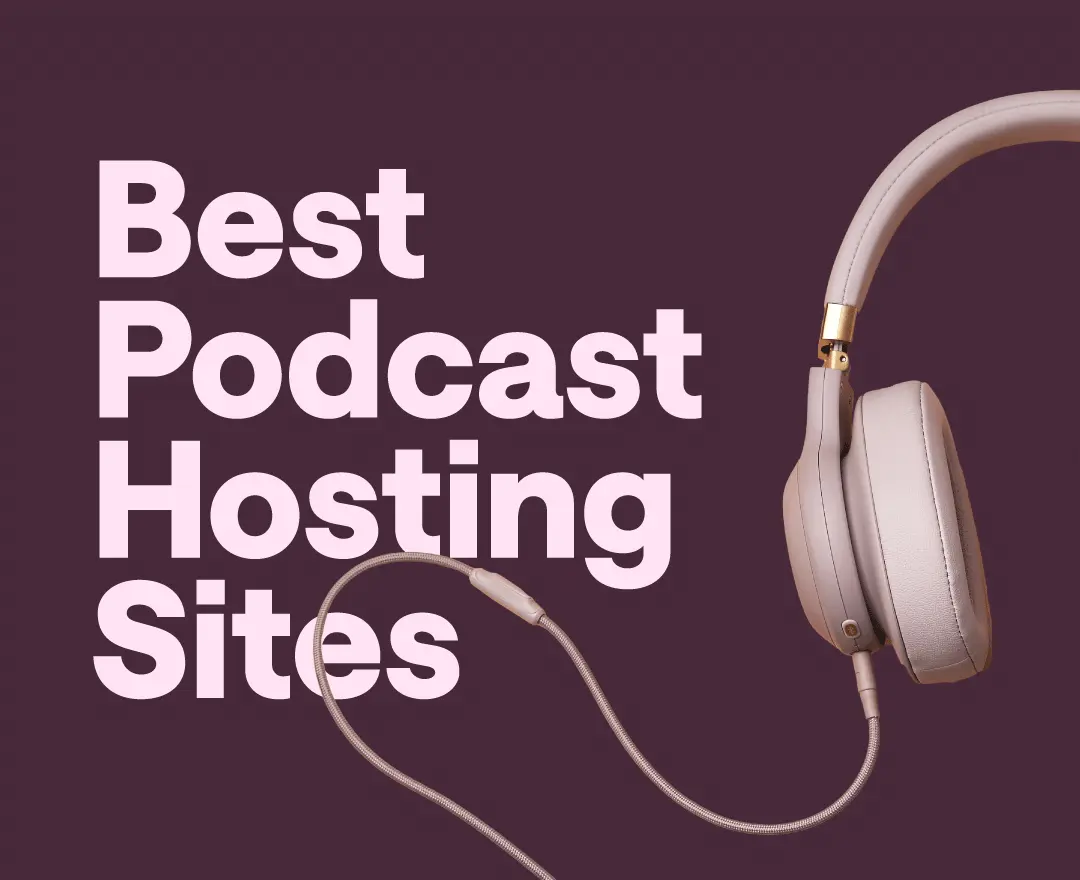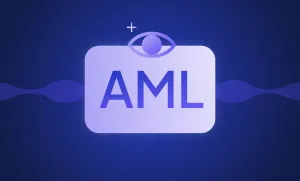Whether you're a seasoned podcaster or just venturing into the world of audio content creation, choosing the right hosting service can be a daunting process. Podcast hosting services play a pivotal role in delivering your voice and ideas to a global audience, but their importance is often overlooked or misunderstood.
The truth is, podcast hosting is about much more than mere storage; it's a comprehensive solution that simplifies the technical intricacies of managing and distributing your content. These hosting companies serve as the digital staging ground where your audio files and RSS feeds come to life, ensuring your podcast reaches the ears of eager listeners worldwide.
10 of the Best Podcast Hosting Sites To Jump On
1) Podcastle
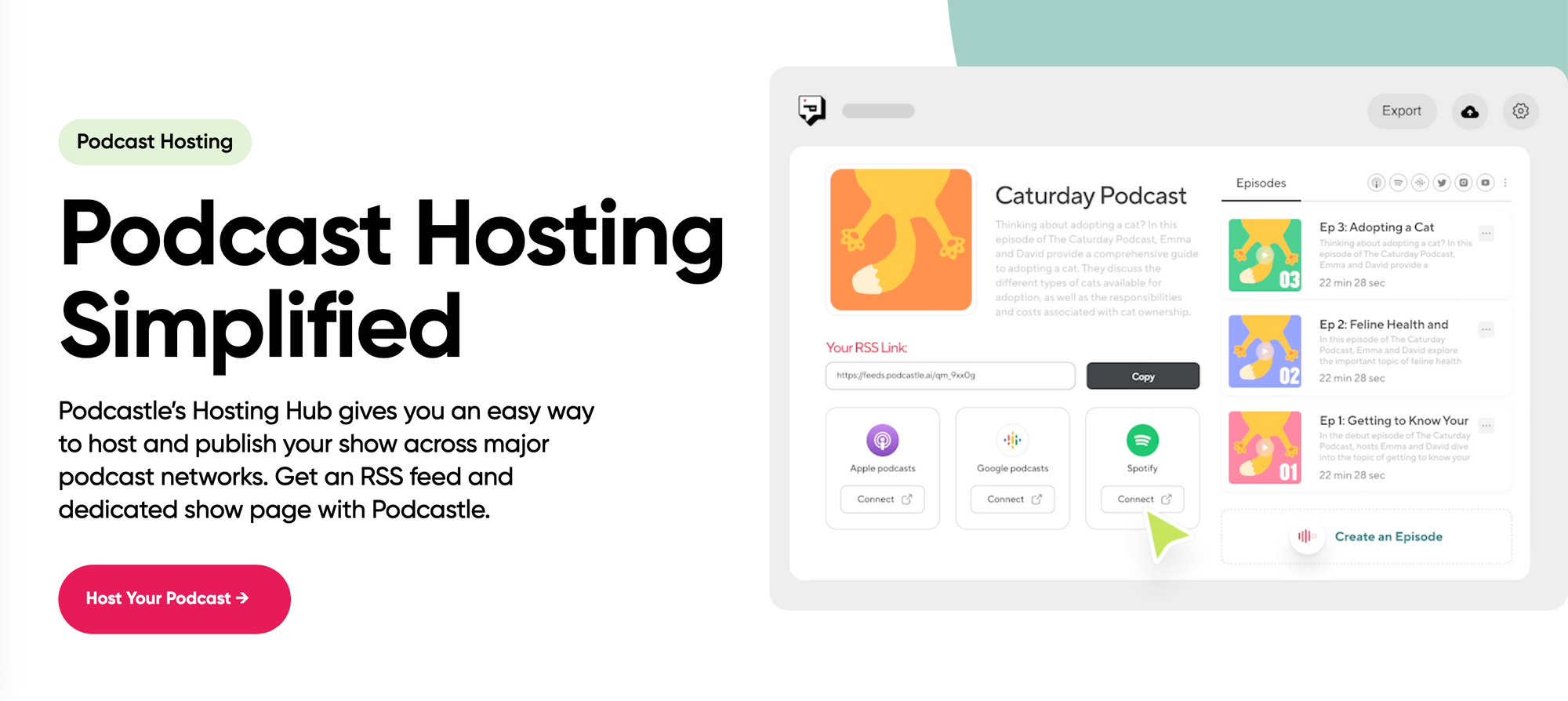
Podcastle stands out as the premier podcast hosting site, primarily due to its exceptional free Hosting Hub feature. The Hosting Hub, designed to make podcast publishing accessible to everyone, allows users to create, edit, and publish content seamlessly across major networks such as Apple and Spotify—all within a single platform.
Key Features
1) Simplified Workflow: Podcastle streamlines the content creation process from start to finish. With Hosting Hub, there's no need for file transfers or juggling multiple tools. Users can focus on creating and polishing their episodes without interruptions.
2) Effortless Distribution: Wondering how to reach platforms like Apple or Spotify? Podcastle makes it super easy. Users can create their show and submit it to preferred podcasting platforms in just a few clicks.
3) Dedicated Show Page: In addition to distributing content across major networks, Podcastle provides users with a dedicated page for their show on the Podcastle website. This not only enhances visibility but also offers a platform for users to share their content link or embed a media player on their own website.
4) User-Friendly Launch: Launching a podcast with Podcastle is a straightforward three-step process. Users create a show, publish content to the associated show using the editor, and then share the link directly with their audience. The platform takes care of the rest, ensuring the podcast appears on the chosen podcasting networks.
Pricing:
2. Buzzsprout

Buzzsprout, a stalwart in the podcast hosting sphere for over a decade, continues to be a favored choice for discerning content creators. Renowned for its decade-long commitment to reliability, Buzzsprout boasts an interface that is sophisticated but user-friendly. This platform not only provides intuitive podcast management but also serves as a catalyst for growth. Buzzsprout's comprehensive toolkit offers everything necessary for hosting, promoting, and meticulously tracking the performance of your podcast.
Key Features
1) Showcase your podcast directly on your website, presenting individual episodes or a complete playlist.
2) Access an intuitive analytic dashboard that effortlessly displays statistics over the past 90 days, revealing listener numbers and demographics.
3) Elevate your audio quality by upgrading to 128k stereo optimization.
4) Benefit from the added convenience of a podcast transcription service.
5) Easily schedule your podcast with user-friendly features.
6) Enhance listener engagement by incorporating episode chapter markers, a unique privilege offered by this podcast hosting site.
Pros
– Easy to use to get a podcast set up and going.
– Free website with all of the paid plans.
– Easy to distribute your podcast to top podcast directories.
Cons
– You lose any unused upload time at the end of the month.
– Their free plan only stores podcasts for 90 days.
– Can be a bit more complicated to use advanced features.
Pricing:
3. Spreaker
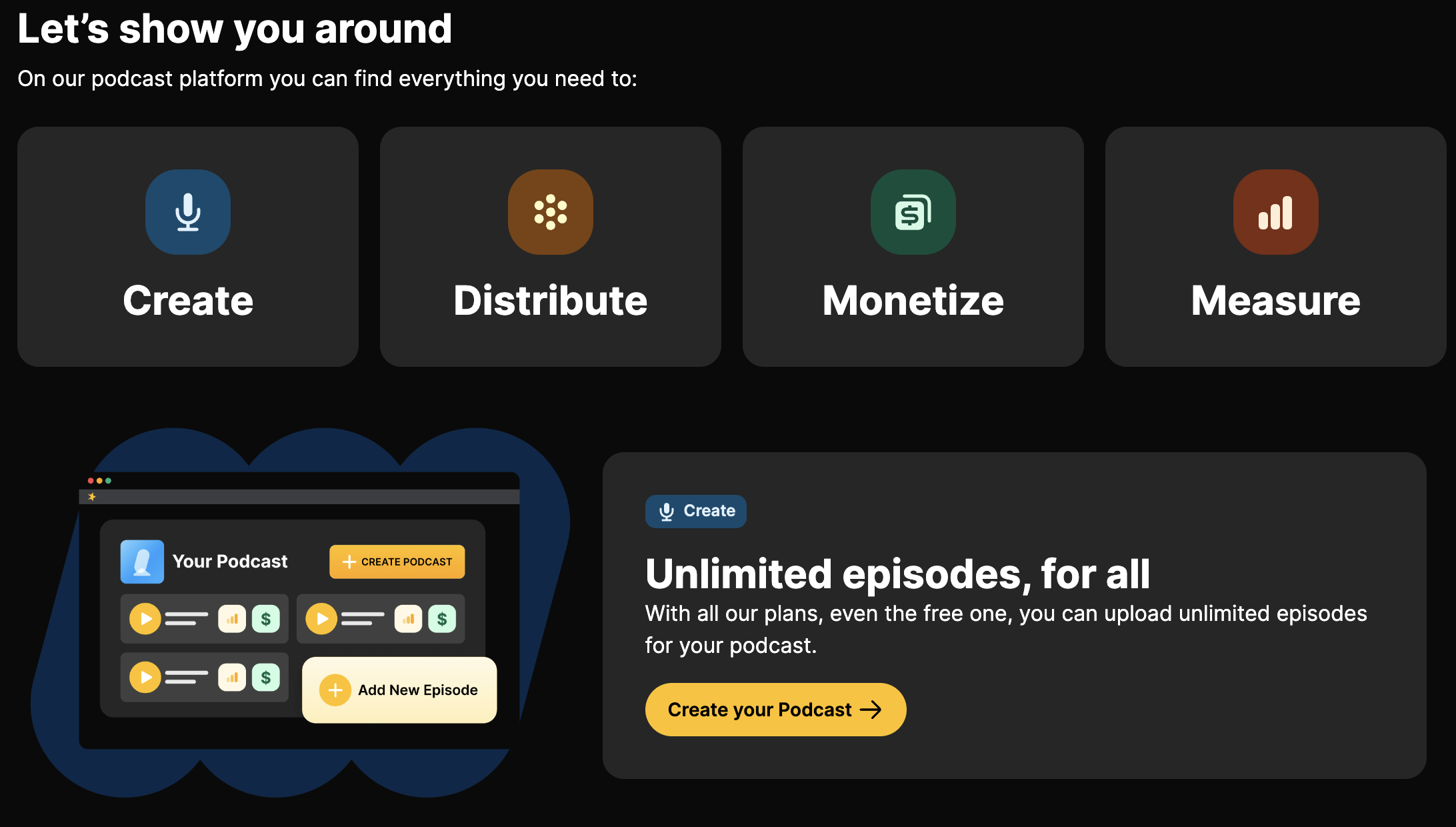
Spreaker, launched in 2010, is a comprehensive podcast hosting platform that caters to both businesses and content creators. It is renowned for its easy-to-use interface, flexible pricing options, and its ability to streamline the process of podcast hosting, distribution, and revenue generation. Spreaker provides tools for creating, hosting, distributing, and monetizing podcasts, and even offers unique features like live broadcasting.
Key Features
1) It has a content management system that allows all types of podcasters to distribute new episodes automatically to the major listening platforms such as Spotify, Apple Podcast, iHeartRadio, etc.
2) Schedule and manage several podcasts under the same account.
3) Set your monetization (with the help of ad insertion) at the show level and the episode.
4) Teamwork privileges, where you can add co-hosters.
5) Analytic system certified by the IAB.
Pros
– Covers all the bases and is extremely user-friendly and convenient.
– Supports live broadcast.
– Integration with Zoom and Skype.
– Supports major distributing portals.
Cons
– Lack of video podcasting ability.
– Lack of integrated functionalities for live streaming and remote recording.
– Steep learning curve.
– Long upload duration.
Pricing:
4. Transistor
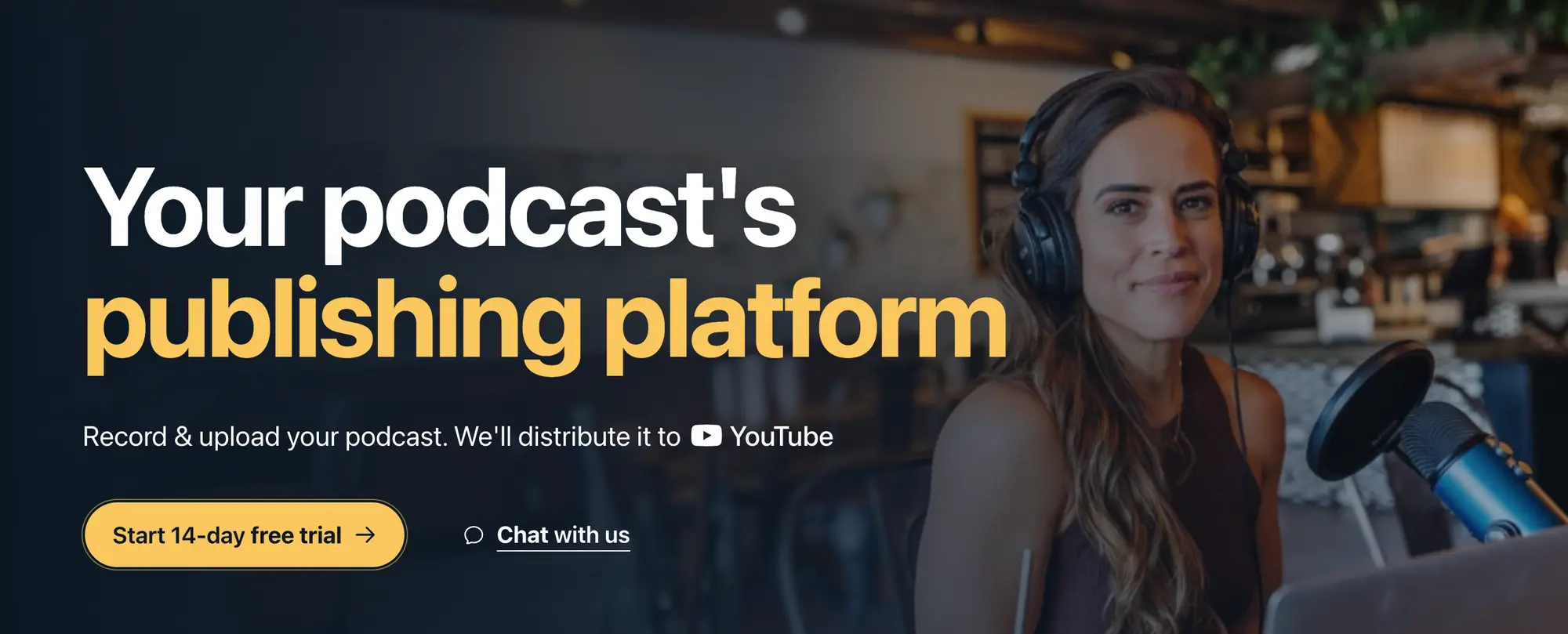
Transistor, a top-tier podcast hosting platform, plays host to popular podcasts such as Cards Against Humanity and Drift. Known for its distinctive analytics and comprehensive tools, Transistor is the go-to choice for cultivating and expanding your podcast audience. Delving into deep statistical insights, their analytics cover subscriber count, downloads over specific periods, average downloads, and more. Plus, the platform offers an easy-to-use migration tool, facilitating the transfer of your feeds from other hosting platforms you may have outgrown. With Transistor, podcasting excellence meets user-friendly features.
Key Features
1) Run unlimited shows.
2) Arrange multiple users for the same account.
3) Create a branded website under your personal domain name.
4) Share your podcast with larger networks.
5) Use advanced statistics and reporting.
Pros
– User-friendly dashboard.
– Supports multiple show creation.
– Quick podcast submission to various repositories.
– Supports multiple integrations.
Cons
– Relatively expensive pricing structure.
– Limited-time, 14-day free trial.
– Advanced analytics features are lacking.
Pricing:
5. PodBean

PodBean is a robust podcast hosting platform that has been in the hosting business for over 14 years, and the impressive numbers they have put up over those years speak to them having a satisfied and loyal customer base. It is used by over 700,000 podcasters worldwide who take advantage of their unlimited storage feature to host over 14.9 million podcast episodes (and counting). One final number shows that those shows have been finding their audience as well: episodes on Podbean have over 12.6 billion downloads.
Key Features
1) Free plan for 5 hours of storage.
2) Unlimited storage for the $9/month plan.
3) Effective ad installation.
4) Patreon program as a reward for recurring revenues.
5) Auto-uploads to YouTube.
6) Auto-posting to social media like Facebook and Twitter
7) Mobile app.
Pros
– Offers unlimited storage on paid plans.
– Supports PodAds and Premium Podcasting for revenue generation.
– Offers mobile app support.
– Supports live streaming.
Cons
– Limited features under the free plan.
– No automatic audio enhancement.
– Dated platform interface that can use some design upgrades.
Pricing:
6. Simplecast

Established in 2013, Simplecast stands as a prominent podcast hosting service, favored by a range of notable creators and brands, including Netflix, Twitter, Facebook, TechCrunch, Politico, Dax Shepard, and Alyssa Milano. Offering top-tier publishing, distribution, sharing, and analytics tools, Simplecast sets itself apart with advanced features like team member access levels, an embedded player, and streamlined upload workflows for swift episode publication. Notably, it boasts an industry-leading, IAB-compliant analytics tool named Audience, providing valuable insights into listener demographics and episode engagement.
Key Features
1) Unlimited hosting, regardless of the pricing plan.
2) Streamlined distribution focussed on broad accessibility for listeners.
3) Useful analytics that allows podcasters to gather detailed insights into their audience's behavior and the performance of their episodes.
4) Podcaster-centric platform design.
Pros
– User-friendly dashboard.
– Can support the creation of multiple shows under one account.
– Quick podcast submission to various repositories.
– Supports multiple integrations.
Cons
– Limited basic analytics.
– Higher cost for larger shows.
Pricing:
7. Captivate
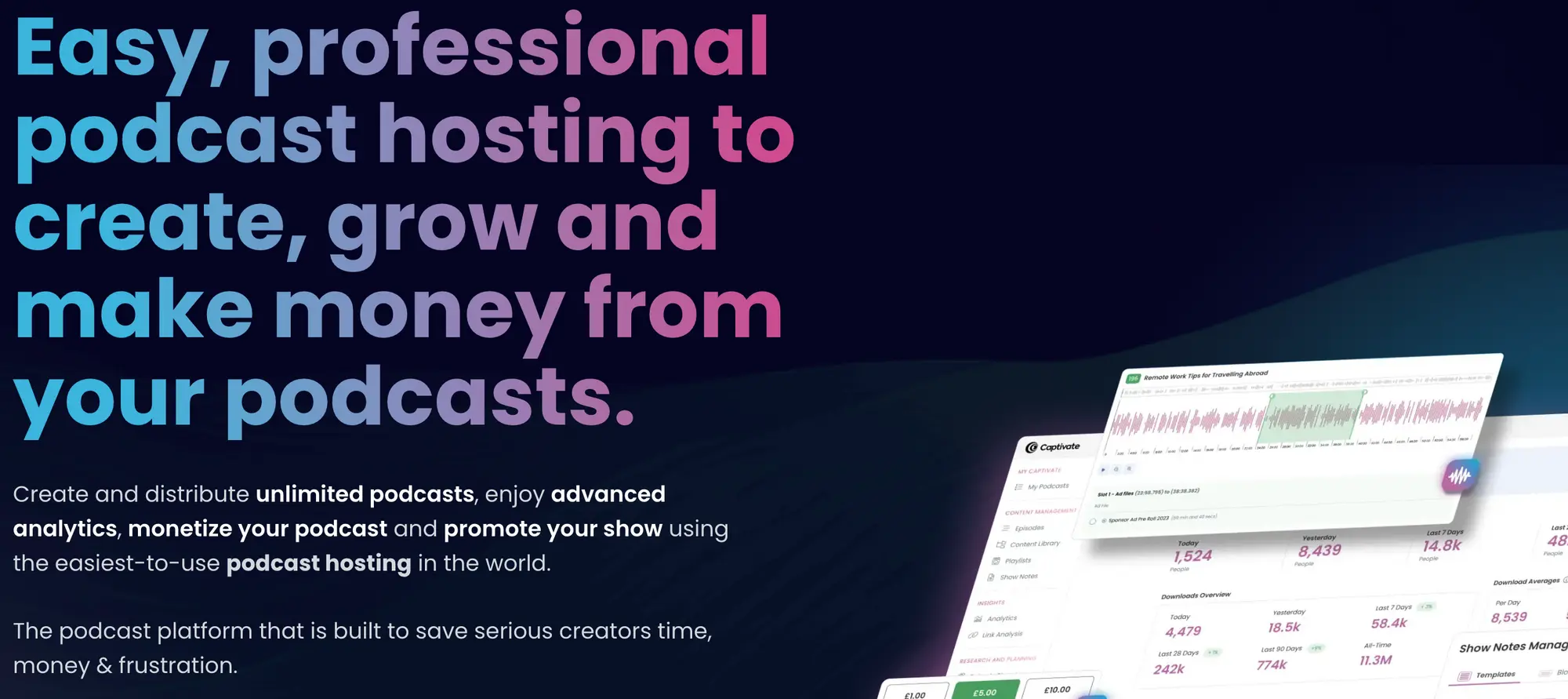
Captivate stands out as a comprehensive podcast hosting and management platform, renowned for its user-friendly design and diverse features that streamline the podcasting journey. Noteworthy aspects include the ability to create and distribute unlimited podcasts, and advanced analytics offering insights into download totals and listener demographics.
While direct monetization is not supported, Captivate compensates with strong promotional tools and a built-in podcast marketing suite. The platform also offers responsive podcast websites through Captivate Sites, providing customizable templates and features such as team bios and email signup forms. Furthermore, Captivate Growth Labs serves as a valuable resource for podcasters, offering a supportive community for learning podcast marketing, SEO, sponsorship acquisition, and overall podcast growth.
Key Features
1) Unlimited podcasts.
2) Simple hosting.
3) Advanced analytics.
4) Embeddable podcast player.
Pros
– Unlimited podcast hosting with unlimited storage in all tiers.
– Creating podcast networks and diversifying podcasts is extremely easy.
– In-depth analysis of the performance of podcasts, audience profiles, and more.
Cons
– Transcription feature is limited and needs improving.
– User interface can be overwhelming.
Pricing:
8. Castos
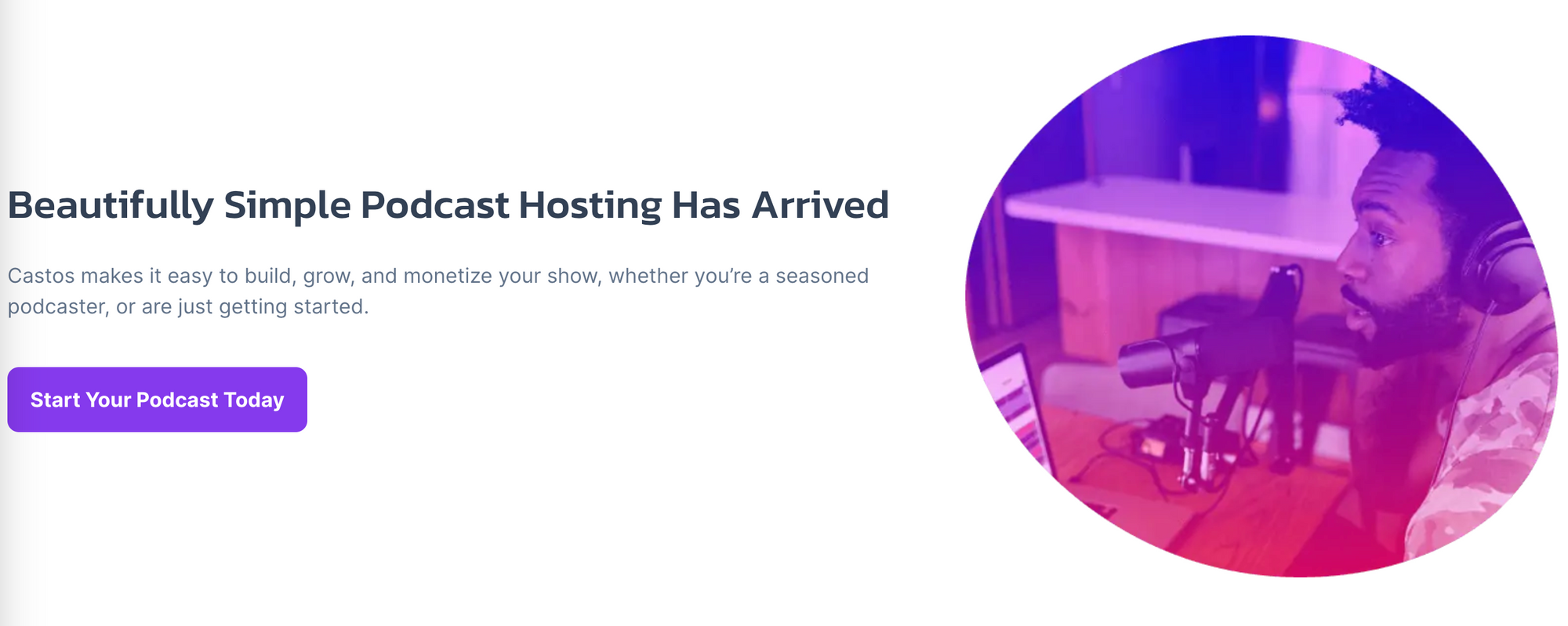
If you're on the lookout for a WordPress-friendly podcast hosting platform, Castos stands out as the top choice. Functioning seamlessly as a WordPress plugin, you can simply visit the Castos website, install the WordPress plugin, and when you're set to host your episodes, conveniently add them within the dedicated WordPress podcast section. All it takes is uploading the audio file, adding the correct description, and voila, your podcast is ready to go live. Once added to your directories, you'll receive a URL that you can easily share with your preferred publishers.
Key Features
1) Unlimited storage, shows, and listeners for a fixed monthly price.
2) Audiogram and YouTube integrations to republish your podcasts on different platforms.
3) Built-in transcriptions to make your podcasts more accessible and SEO-friendly.
4) Podcast editing services that save time and improve audio quality.
Pros
– Seamless integration with WordPress.
– Automated podcast transcription.
– YouTube republishing helps podcasters get better exposure.
– Easy migration from other hosting platforms.
Cons
– Limited customization of hosted site and podcast player.
– Only allows monetization with private podcasts and doesn’t have an integrated advertising feature.
– Monthly cap on downloads and the number of private subscribers.
Pricing:
9. Podcastics

Podcastics, a cloud-based podcast management platform tailored for content creators, stands out as another leading podcast hosting service. The unified platform gives you the ability to import, edit, and monetize your podcast, and analyze its traffic. With detailed analytics, automated audio editing, and even the capability to create articles, Podcastics is a comprehensive solution. Boasting unlimited episodes, no storage limits, and global access through a Content Delivery Network (CDN), it has gained popularity for its user-friendly interface and competitive features.
Key Features
1) AI-powered Fast Transcription feature allows for quick and automatic transcription of podcast episodes.
2) Highlight active words, use the “find and replace” feature, and alter audio playback speed with useful editor tools.
3) Worldwide distribution with the worldwide Content Delivery Network (CDN).
Pros
– Easy to use with a modern UX and detailed analytics.
– Allows you to import your existing podcast from Apple Podcasts or any RSS feed.
– Offers an automatic website generated for your podcast.
– Provides worldwide distribution of your podcast.
Cons
– No free plan available.
– Doesn’t come with an integrated plugin.
– Restrictions on the duration of your recordings.
Pricing:
10. Fusebox
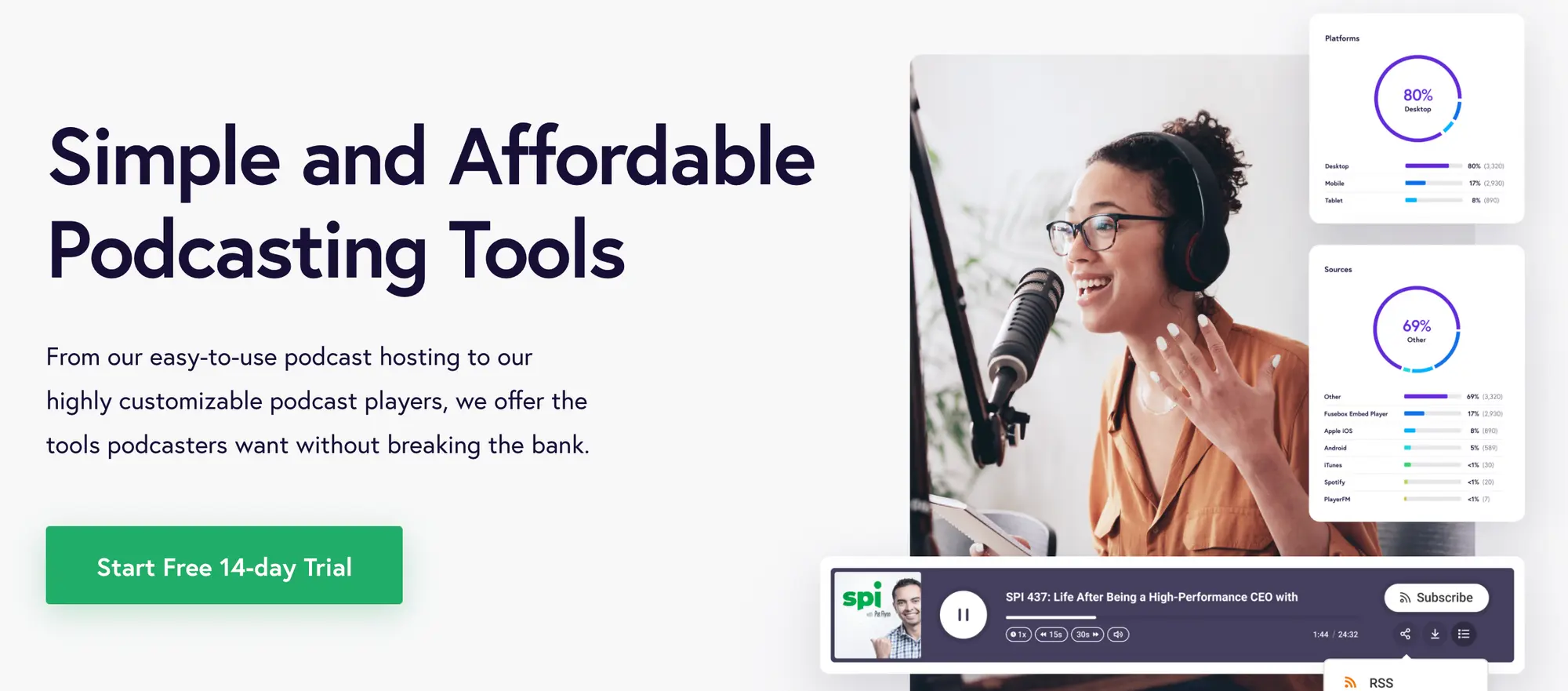
Fusebox, crafted by podcasters for podcasters, is more than just a hosting platform; it's a toolkit for enhancing the listening experience, building your audience, and extending your reach. Fusebox functions as a WordPress plugin for publishing podcast episodes on your blog or website, and comes equipped with a user-friendly array of advanced features to simplify the process.
Key Features
1) Email Capture Tool: Boost your email list with Fusebox’s email capture tool.
2) Sticky Player: Allows your podcast player to be visible all the time.
3) Transcript plugin with SEO-friendly live text.
Pros
– Easy to use with a modern UX.
– Provides tools with multi-platform support to embed players into your website.
– No limit to bandwidth use.
– Each time a person downloads an episode of your podcast through the Fusebox audio players on your website, it counts towards your statistics.
Cons
– Only compatible with WordPress websites.
– Not equipped with built-in tracking stats for the number of downloads per episode.
– Video is not supported.
Pricing:
Best Free Podcast Hosting Sites
1. Podcastle
It should be no surprise that our number one pick for hosting services overall is also our pick as the number one free service! Podcastle's Hosting Hub stands out as the best free podcast hosting site by combining user-friendly features, seamless distribution, a dedicated show page, and a hassle-free launch process—all without any cost to the user as hosting is included in the free plan.
2. Spotify for Podcasters
Formerly known as Anchor, this platform provides creators with a comprehensive dashboard to create, manage, and enhance their shows. It stands out as one of the best free podcast hosting services due to its unlimited free hosting, detailed analytics, audience growth tools, and integrated advertising platform.
3. PodBean
With a generous allocation of 5 total storage hours, beginner podcasters are given a comfortable runway to experiment and find their footing without needing to pay for a subscription. The platform offers the added benefit of creating a free personalized podcast site with a variety of themes to choose from for every account, instantly boosting your podcast's online presence.
4. Buzzsprout
Buzzsprout's free plan is an ideal option for budget-conscious beginners. It allows you to upload up to two hours of content per month and hosts your files for a 90-day trial period. While this plan serves as an introduction to Buzzsprout's main features, it's important to be aware that ads will be present on the site during this period. Nevertheless, the free plan provides a 90-day grace period, offering ample time to assess how Buzzsprout aligns with your needs.
5. Spreaker
Spreaker’s free plan makes it an attractive choice for those looking for free podcast hosting. This plan allows you to upload unlimited episodes, provides basic stats such as download count and daily listeners, and even includes a monetization tool. However, it does limit live broadcast sessions to just 15 minutes.
